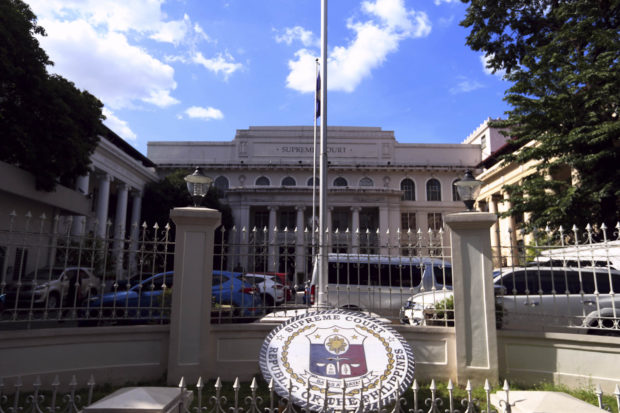Praising SC ruling on drug searches, bishops say anti-terrorism law ‘like Nazi decree’

BASTION OF RIGHTS The Supreme Court building in Ermita, Manila. —EDWIN BACASMAS
MANILA, Philippines — Catholic Church leaders on Wednesday lauded a Supreme Court ruling invalidating warrantless police searches and seizures based on unverified and anonymous information as youth leaders filed the 29th petition against Republic Act No. 11479, or the Anti-Terrorism Act of 2020.
“Bravo, Supreme Court!” Caloocan Bishop Pablo Virgilio David, acting president of the Catholic Bishops’ Conference of the Philippines, posted on his Facebook account.
“Since the war on drugs began, the impunity, the blatant disrespect for the law, for human life, human dignity and human rights, has been more the rule than the exception with regard to the conduct of our ‘law enforcers,’” he said.
Eroding public trust
David lamented that the government’s war on drugs has successfully destroyed not the business of illegal drugs “but the integrity and credibility of our own police institution” and “has profoundly demoralized the ‘few good people’” in the police force.
Bishop Broderick Pabillo, Manila’s apostolic administrator, in a text message to reporters also hailed the high court’s 11-3 decision that invalidated warrantless police searches and seizures based solely on an unverified anonymous tip.
Article continues after this advertisement“The Constitution and human rights have to be respected even in the war against drugs,” Pabillo said.
Article continues after this advertisementThe two bishops hailed the landmark civil rights ruling as youth leaders, in the 29th petition filed against the new Anti-Terror Act of 2020, likened the controversial law to the first of several repressive decrees that turned Germany into an authoritarian state prior to World War II.
Plea of the youth
Eleven Sangguniang Kabataan officials, nine Pasig youth leaders and the Jovito R. Salonga Policy Studies likened RA 11479 to the Reichstag Fire Decree of 1933, backed by then Chancellor Adolf Hitler, “that provided the legal basis for a fascist regime to flourish in what was once a democracy, and to commit some of the worst atrocities ever recorded.”
“Much like the Reichstag Fire Decree, this most recent enactment of Congress single-handedly infringes on what many modern democracies consider as basic and essential rights,” the youth argued, adding that it was not far-fetched that RA 11479 could be similarly used to suppress civil rights.
The youth leaders also said the Anti-Terrorism Act disregarded the principle of separation of powers by granting the Anti-Terrorism Council the authority to order the arrest and prolonged detention of suspects, which the Constitution reserves solely for the judiciary.
Farther from democracy
They asked the Supreme Court to nullify the new antiterror law for infringing on constitutionally guaranteed freedoms and usurping judicial powers.
“The Constitution sets the limits for government action and these limits cannot be casually ignored or trampled upon at the expense of people’s liberties even on the basis of national security,” they said.
“Like Germany did in 1933 when it enacted the Reichstag Fire Decree, this country now stands on perilous grounds. With every unjust law enacted and upheld, the country inches farther from democracy,” they added.